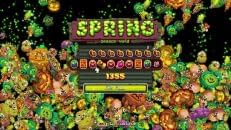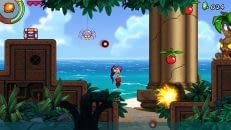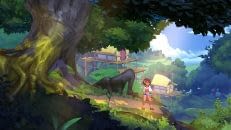The Indie Difference – Comedy
[This editorial was originally published in issue 31 of The Indie Game Magazine in March 2013]
The Indie Difference is a new editorial series intended to highlight specific elements that make independently-developed games special. The series is a celebration of the indie gaming hobby, with a particular focus on what differentiates indie games from their big budget, AAA counterparts. This time it is Comedy that falls under the spotlight.
If you’re reading this, then you’re presumably a pretty avid fan of indie games. We all have our own reasons for getting into the wonderful world of independent videogames, but it is likely we all have one thing in common — we turned to indie games because they offered something that mainstream releases didn’t. For me, indie games provided an escape from the po-faced, humorless realism with which the AAA industry has been obsessed this console generation. My discovery of the smaller, self-funded projects opened my eyes to the fact that there was more out there besides hokum, gritty action — videogames could actually be funny!
By their very nature, independent titles are clearly better suited to comedy than AAA releases. For starters, humor has proven a risky business in the mainstream games market; most big-budget comedy games of this generation have either been commercial flops like Brutal Legend, or lowest-common-denominator tie-ins like Family Guy: Back to the Multiverse. In this climate, it’s very difficult for a publisher to take a punt on a comic title with any confidence. The resulting lack of humor in the market has left it up to indies to fill the void, their smaller budgets and lack of publisher-reliance giving them more leeway to explore niche themes.
To get a perspective from within the industry, I contacted some independent developers whose games heavily feature comedy. First up is Andrew Goulding of Brawsome, developer of Jolly Rover and MacGuffin’s Curse. He suggested that the stagnation of the mainstream market was just a result of sensible business decisions by publishers.
“The rising cost of AAA development makes publishers risk averse.” he said. “Sequels and licenses sell, so do big genres, such as FPS, so anything that’s not one of those can be hard to get made with AAA publisher money. There are also smaller publishers in the casual/mobile space, but they generally have even smaller margins, so they want to spend a little amount on something that might be a big hit. Sequels, licenses and big genres in this space also apply. Publishers are a business, out to make money, so are after hits, so whatever is popular at the time will be what they want to invest in. This just makes good business sense. So yes, in a roundabout way indies are important for working in niche genres and creating new ones.”
As is the way of the world, business concerns naturally outweigh the search for creative fulfillment in the publishing business. However, in the indie space this is often reversed, with small teams working on games with individual passion and little concern for their resulting popularity. This creative community atmosphere is obviously great for nurturing and encouraging less common forms expression, such as comedy, and gives the resulting works a far more personal feeling than would be possible in a triple-A game. I contacted Jesse Ceranowicz of GZStorm, developer of surrealist comedy title Vidiot Game, to ask him his thoughts on how implementation of comedy differs between mainstream and indie releases. Unexpectedly, he defended the current state of humor in videogames.
“I wouldn’t necessarily say triple-A titles are distancing themselves from humor”, he said. “Franchises like Saints Row and Borderlands (just to name a few) employ humor in various ways and are quite successful at it. Indie developers tend to embrace humor in slightly stranger ways, but that’s mainly due, I think, to the fact that indies work in such a closed-in environment. That is to say, they work in such small groups, if not on their lonesome, that their humor cannot help but be geared more towards their own inside jokes and such.”
He raises an important point here, as it’s important to remember that humor isn’t completely lacking from the AAA landscape. The two examples he gives, Saints Row and Borderlands, have both enjoyed widespread popularity, managing to successfully avoid the curse of comedy. However, I maintain that there remains a distinct difference between how humor is implemented in independent and mainstream productions. When looking at it from this perspective, one could say that Saints Row: The Third and Borderlands 2 are the gaming equivalent of the big-budget, crowd-pleasing comedies which have a broad appeal in their catch-all brand of humor. Not necessarily a bad thing, sure, but meanwhile games like Frog Fractions and Vidiot Game represent the slightly more niche comedic efforts which have a significantly narrower audience, but are ultimately more rewarding for those in the know. It is their independence that gives them the edge. Their freedom to dabble in surrealism and in-jokes gives them the all-important feeling of something hand-crafted and personal, something which I feel is very difficult to convey in a game developed by a huge team.
In games like Saints Row, there’s the unshakable feeling that the inclusion of comedy was a decision made at a marketing level. It helped to give THQ a unique selling point and to differentiate their franchise from the oft-imitated Grand Theft Auto. Not to detract from the humor — Saints Row: The Third is a barrel of big, dumb, thoroughly enjoyable laughs — but it felt like the result of a focus group. Conversely, the comedy of indie games is often obscure, surreal, and feels human. The appeal is in its absurdity and unpredictability, the feeling that anything and everything can happen, creating more and more amusing gameplay dynamics and scenarios.
Frog Fractions is a great example of comedy that only an indie could have created; a multi-genre arcade game which evolves as you play, posing as an educational game for children. Even more incredibly, it was so bizarre and funny that it attracted mainstream attention, and ended up being promoted by major gaming websites such as Destructoid. Does this suggest that humor can be used to create a buzz around indie games, and help attract new players? Sparsevector, developer of Super Amazing Wagon Adventure, certainly thinks so, and this became clear when he told me of his development experience.
“Humor is a pretty big part of my game, Super Amazing Wagon Adventure“, he said. “In the game you control a 19th century wagon party facing surreal and bizarre dangers as they journey west. I think a big part of the appeal of the game is the dark humor in seeing your party die off one-by-one in strange and surprising ways. At its core my game is a simple side-scrolling shooter with some twin-stick shooting segments mixed in, but I think with the game’s unusual theme and humor I was able to draw in players outside of the traditional shmup fan base. While the humor doesn’t really affect the game’s mechanics, it has a big effect on the feel of the game.”
All other entertainment mediums have strong comedic presence, so why shouldn’t games? The growth and development of humor in videogames — nearly all of which is now coming from indies — is surely conducive to the growth of the medium as a whole. Humor has a great quality of attracting people, and could help games to find an audience outside from the typical ‘gamer’. This has certainly been the case with Frog Fractions, and by the developer’s own account it is also true of Super Amazing Wagon Adventure.
It’s the indefinable human touch which makes the comedy of indie games so great. Never afraid to be nonsensical, silly, or even self-indulgent, you can always count on indie devs to deliver the unexpected. I think it’s a great step forward that humor is showing signs of revival in the mainstream games market, and I have the utmost respect for titles such as Borderlands and Saints Row. However, I think the gaming comedy renaissance will come not from the big publishers, but from the bedroom coders and small studios who are willing to go the extra mile.






